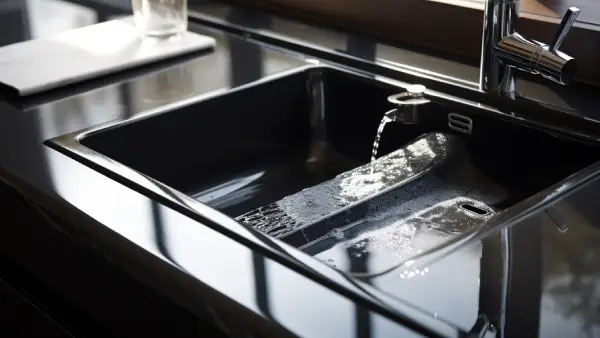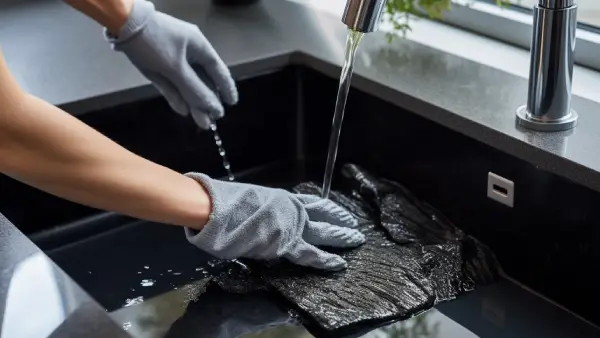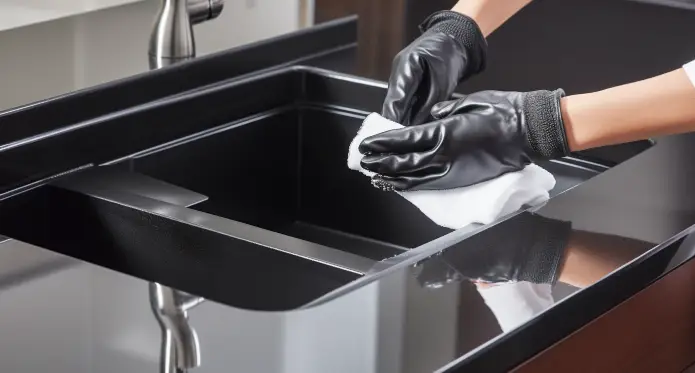Last Updated on November 14, 2023
Cleaning your black granite kitchen sink is a simple yet essential task that can keep this focal point looking pristine and beautiful.
Whether you’re dealing with daily grime, stubborn stains, or a persistent white haze, the black granite kitchen sink cleaning process is straightforward.
To clean your black granite sink, remove any food scraps, debris, or dishes from the sink for a fresh start.
After that, sprinkle baking soda evenly throughout the sink and add a touch of white vinegar to tackle grime and stains effortlessly.
A gentle scrub with a soft cloth or brush, followed by a thorough rinse, leaves your sink gleaming.
Let’s explore the details of the easy and efficient cleaning process to keep your black granite kitchen sink looking its best.
How to Clean a Black Granite Kitchen Sink: Step-ByStep Guide

To clean a black granite kitchen sink, you should follow these procedures:
- Step 1: Gather the necessary cleaning materials
- Step 2: Pre-clean the sink
- Step 3: Apply the cleaning agents
- Step 4: Scrub and thoroughly wash the sink
Step 1: Gather the Necessary Cleaning Materials
Ensure you have all the necessary cleaning materials for your black granite kitchen sink, like white distilled vinegar and baking soda.
You’ll also need a soft cloth or soft-bristle brush to apply the cleaning solution and mild dish soap for extra cleaning power. To deep clean hard-to-reach areas, also take a soft sponge or toothbrush.
Step 2: Pre-clean the Sink
Before you start cleaning, remove any food scraps or debris from the sink. Simply use your hands or a small brush to clear away any solid residue. For larger debris or dishes, take a moment to empty and clear the sink entirely.
Afterward, thoroughly wet the sink by filling it with warm water and draining it. As a result, you’ll loosen any dirt or grime that may be stuck to the sink’s surface.
Step 3: Apply the Cleaning Agents
Now, grab the vinegar and baking soda as cleaning agents for your black granite kitchen sink, ensuring a thorough and effective deep clean.
Sprinkle some baking soda powder evenly throughout the sink, covering all areas. Add a modest amount of white vinegar on top of the baking soda.
The reaction between vinegar and baking soda produces a foaming agent that may dissolves silicone, grease and dirt .
Step 4: Scrub and Thoroughly Wash the Sink
Take your soft cloth or brush and vigorously scrub the black granite sink’s surface, removing all stubborn grime and stains.
Start by focusing on problem areas or stains, using gentle but firm pressure to break up and remove any built-up dirt or residue.
Pay attention to corners and edges, where grime tends to accumulate. Work your way around the sink, covering the entire surface.
Once you’ve scrubbed the sink, rinse it thoroughly with warm water to ensure that all vinegar and baking soda residue is completely washed away.
What Should You Avoid Using When Cleaning a Black Granite Kitchen Sink?
When you clean a black granite kitchen sink, there are certain things you should avoid using.
1. Abrasive Materials
You should avoid using any abrasive materials, such as steel wool or scouring pads, when you clean your black granite kitchen sink.
These materials can cause scratches on the black granite kitchen sink’s surface, leaving unsightly marks that can be difficult to remove.
Instead, opt for gentler cleaning methods that will effectively clean your sink without damaging it.
2. Harsh Chemicals
Avoid using bleach or drain-blocking chemicals, as they can harm the appearance of your black granite kitchen sink. These harsh chemicals can harm the sink’s surface over time, leading to discoloration or even scratches.
3. Excessive Heat
To prevent damage to your black granite kitchen sink, you must refrain from using excessive heat. While black granite sinks are known for their durability, extreme heat can still have adverse effects.
Avoid pouring scalding hot water into the sink during cleaning, as extremely high temperatures may cause thermal shock and potentially lead to cracks or damage over time.
Instead, opt for warm or moderately hot water when cleaning. Additionally, be cautious when placing hot pans or dishes directly on the black granite sink’s surface, as this can also cause damage.
How often should you clean your black granite kitchen sink?
To maintain the beauty and functionality of your black granite kitchen sink, it’s recommended to clean it regularly, typically daily to weekly, depending on your usage and preferences.
Daily wiping with a mild, soapy solution and a soft cloth can help prevent the buildup of stains, food residue, and water spots.
You can use a specialized granite cleaner or a mixture of water and vinegar to remove any stubborn stains or mineral deposits for a deeper clean.
Also, it’s a good practice to rinse the sink thoroughly after each use to prevent any acidic or harsh substances from causing long-term damage.
Can you use bleach to clean the black granite kitchen sink?

You should never use bleach on your black granite kitchen sink, as it can damage the surface and cause staining. Bleach contains harsh chemicals that are too abrasive for sensitive materials like black granite.
When bleach comes into contact with the black granite sink’s surface, it can cause discoloration, etching, or even deterioration of the protective seal. This can lead to permanent damage and a dull, unattractive appearance.
Do you need to apply oil to a black granite kitchen sink after cleaning?
Applying oil isn’t always necessary but can help maintain the appearance and shine of a black granite kitchen sink after cleaning.
It is highly recommended that you apply oil to your granite sink, such as mineral oil, baby oil, or olive oil.
Applying a thin layer of oil creates a protective barrier that helps prevent the buildup of hard water and mineral deposits on the black granite sink’s surface.
Clean and Preserve the Elegance of Your Black Granite Sink
To keep the black granite sink in your kitchen clean and shiny, follow the above-mentioned steps and precautions.
Regular cleaning with gentle methods like vinegar and baking soda will help maintain its beauty without causing damage.
Avoid abrasive materials, harsh chemicals like bleach, and excessive heat to protect the kitchen sink’s surface. Applying oil after cleaning adds an extra layer of protection, preventing the accumulation of hard water stains.
By incorporating these practices into your kitchen, your black granite sink will remain a striking focal point in your kitchen sink maintenance routine.

